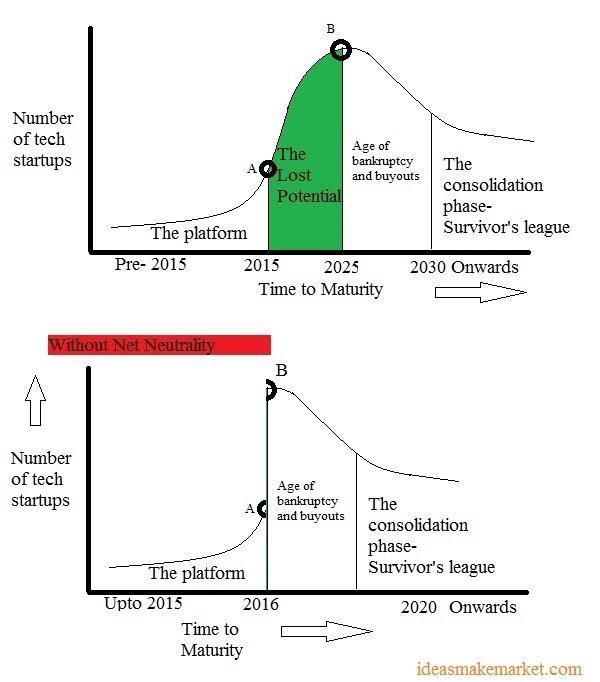What is net neutrality? The ability to access internet services without any discrimination between the services, thus giving the ultimate power to the consumer. Earlier this year, there was massive outcry during the net neutrality saga over platforms like Flipkart signing up on Airtel zero. It was assumed that the chapter had ended there.
However a new tale has apparently begun. Telephone Regularity Authority of India (TRAI) has once again asked for views on free mobile data latest by Dec 30th and counter views by January 7th whether free data plans are in violation of net neutrality.
Let’s try to analyse both sides of the argument. Why do telecom companies feel that plans like internet.org are the way forward? One simple way to understand is that it will give them a sense of control over which site is visited, thus shifting the power of choice from consumers to operators. But behind it is a deep sense of revenue. The rates for voice calling in India is the lowest in the world and data is primarily seen as the engine of growth. (This segment is expected to see lot of action with the much anticipated entry of Reliance Jio. ). As mobile phones are increasingly becoming the primary medium of internet access, mobile operators see this as the mode to change their dipping fortunes.
In the recent past, mobile operators have started charging higher data rates for services like Whatsapp and Skype. Is it not in some ways against the very principle of net neutrality? In effect, data companies are directly discriminating against these apps and discouraging the users. Now imagine the ability to access some apps for free, and that too in a price sensitive market like India, will lead to a scenario where consumers are no longer important. Instead, service providers will determine the rules of access.
The result: Big pocket businesses like Flipkart will start spending enormous amounts on getting these premier slots, and smaller ecommerce start-ups will perish. Thus, ventures like Airtel zero and internet.org have the potential to kill the tech startup revolution in the country.
A counter suggestion has been provided by TRAI, suggesting what if the company pays all the operators and not any one like internet.org. But just think for a second, does it not sound absurd? It is almost like TRAI suggesting, forget net neutrality- this is the future. Can a small startup afford to compete with biggies in such an atmosphere?
If we look at the startup boom in our country and compare it on a maturity level, we are somewhere at point A. In the event net neutrality becomes a reality, we will jump to point B in almost no time. I have made the below graphic to illustrate the same. Without net neutrality, the region marked “The Lost Potential” will indeed be lost forever. The startup boom will come to a premature halt.

A pictorial representation using lifecycle graph about impact on startups in the absence of net neutrality.
Are we ready to kill these yet unborn start-ups and potential Google in the pretext of providing free internet? Access to free internet will undoubtedly create some new ventures but kill far more. It is almost like saying nuclear weapons are good because nuclear energy can also be used for peaceful purposes. In a similar way internet is probably the greatest asset as long as it creates a level playing ground. Besides, a website / app is probably the most cost effective way to start providing a new product or service. Is this the price for digital India that entrepreneurs have to pay?
The Snapdeal app might have been uninstalled by many users in the wake of the recent Amir Khan controversy, but there is a lot to admire about their stand on net neutrality.
We can only hope other ventures can learn a thing or two from Snapdeal on how to respect and let the ecosystem flourish.
Are we ready to let service providers decide, which app or website to visit ? Are we, seriously ?
Tags: flipkart internet.org net neutrality snapdeal telecom traiYou might like reading:
Marketing 2020 –The shift from ‘acquisition’ to ‘retention’
Gone are the days when people battled for acquiring property, people & territories. Traditional approach of acquiring was always been costly and time consuming. Thus, our beloved Marketers started thinking whether this shift from ‘acquisition’ to ‘retention’ is required or is it better off this strategy. Let’s discuss what our future marketing will look like – A Warrior or A […]

Save Earth- CSR for the mining industry
Current Situation With the growth in economy there has been extensive pressure on resources. There has been a significant increase in the mining operations across the world. Though it aids in the development, it comes with its own set of problems, the most lethal of them being Dust, Land and Water Pollution. Lets us see how we can go about […]































Interesting viewpoint@Abhirup
Thanks 🙂 Glad you liked it